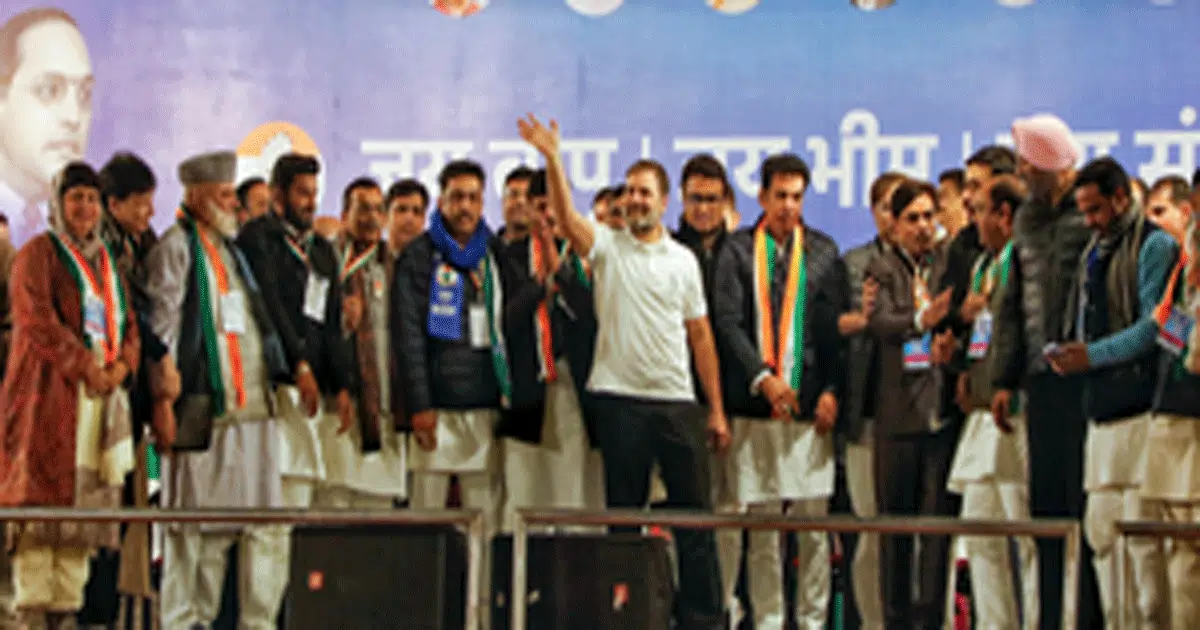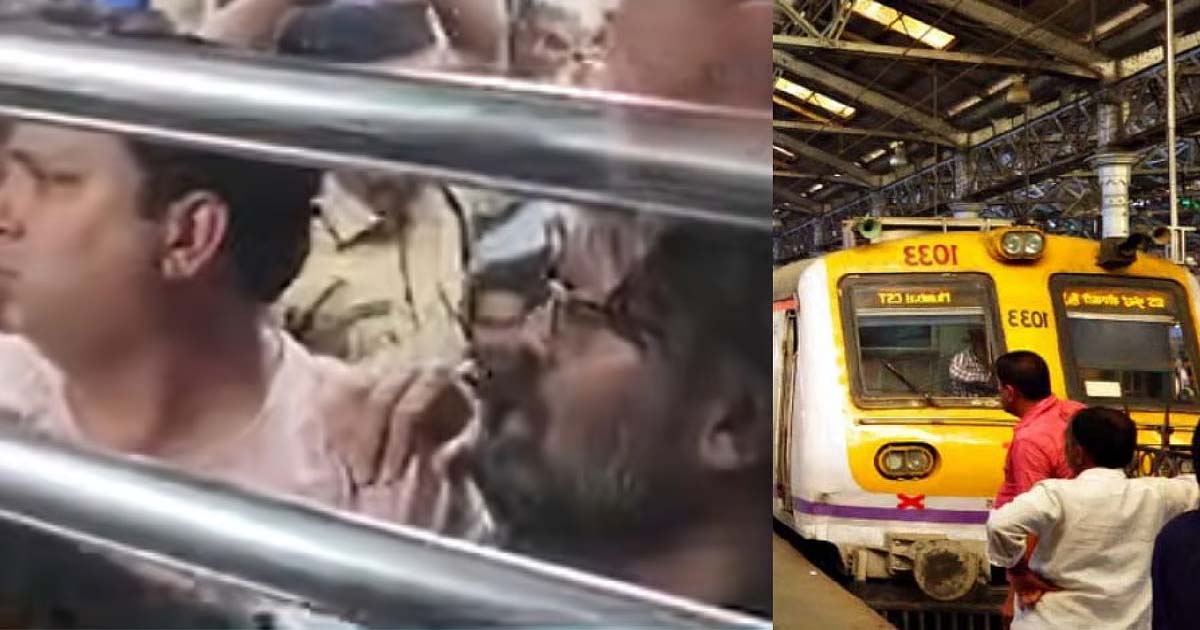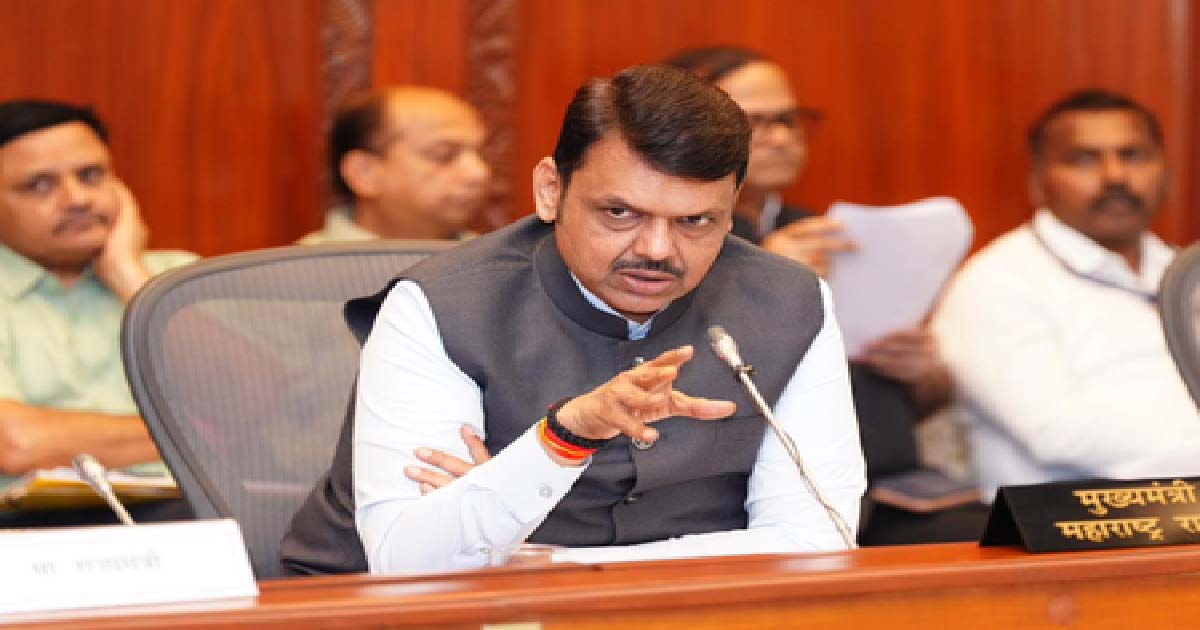National News
Cong flop show in Delhi: Knocked out of top 3 slots in 3 constituencies

New Delhi, Feb 8: As the counting for the Delhi Assembly elections nears its conclusion, the Congress party, once a dominant force in the national Capital, appears set for yet another electoral washout, failing to win even a single seat this term.
The Congress, which ruled Delhi for 15 consecutive years from 1998 to 2013, is now staring at its fourth straight defeat in Assembly elections, underscoring its sharp decline in influence across the city.
This time, the party’s struggle was particularly evident in three key Assembly seats — Mehrauli, Okhla, and Mustafabad.
In Mustafabad, BJP candidate Mohan Singh Bisht emerged victorious with a lead of over 17,000 votes. The AAP’s Adeel Ahmad Khan secured second place, while AIMIM candidate Tahir Hussain — former AAP Councillor and a key accused in the 2020 Delhi riots — finished third. Congress candidate Ali Mehdi was left trailing far behind.
In Mehrauli, the BJP’s Gajender Singh Yadav maintained a lead, with the AAP’s Mahender Chaudhary in second place.
An Independent candidate, Balyogi Baba Balaknath, was in third place, while Congress candidate Pushpa Singh lagged at fourth place, with only two rounds of counting left.
Mehrauli is part of the South Delhi Lok Sabha constituency, which comprises nine other Assembly segments, including Bijwasan, Sangam Vihar, Ambedkar Nagar, Chhatarpur, Deoli, Kalkaji, Tughlakabad, Palam, and Badarpur. The BJP is leading in six of these seats.
In Okhla, AAP’s Amanatullah Khan maintained a strong lead of over 30,000 votes. AIMIM candidate Shifa Ur Rehman Khan was in second place, followed by BJP’s Manish Chaudhary.
Congress candidate Ariba Khan trailed at fourth, with eight rounds of counting remaining.
Congress candidate Sandeep Dikshit, contesting from the New Delhi Assembly seat, admitted to the party’s poor performance, calling it “disappointing” and acknowledging that Congress had failed to reconnect with Delhi’s voters.
“We had hoped for 12-13 per cent of the vote share, but we fell short. We wanted to make a place for Congress in the hearts of the people but failed. It is disappointing,” Dikshit told media.
Asked about the reasons behind the Congress’ dismal showing, he said, “It is difficult to pinpoint right now. Maybe people wanted to vote for the Congress but were unsure if we could form a government, so they chose other parties instead.”
Dikshit was in a three-way battle in New Delhi against AAP National Convenor and former Chief Minister Arvind Kejriwal and the BJP’s Parvesh Verma, who won the seat.
As counting continues, early trends from the Election Commission of India (ECI) show the BJP crossing the halfway mark, leading in 48 of Delhi’s 70 Assembly seats, while the AAP is ahead in 22. The Congress, however, remains absent from the tally.
Exit Polls had predicted a significant loss for the AAP, with the BJP expected to win between 45-55 seats. The Congress was projected to win just one seat but has failed to achieve even that.
The party’s failure to open its account once again underscores its declining relevance in Delhi politics. Once a formidable force under former Chief Minister late Sheila Dikshit, the Congress has been struggling to regain lost ground since the AAP’s rise in 2013.
Early trends initially showed the Congress leading in Badli, but this advantage quickly dissipated. With no leads in any constituency, the party is poised for another electoral wipeout.
The poor performance comes despite a high-profile campaign led by Congress chief Mallikarjun Kharge, Leader of Opposition in the Lok Sabha Rahul Gandhi, and Wayanad MP Priyanka Gandhi, who held multiple rallies in the run-up to the elections.
The Congress’ vote share has also been on a downward trajectory. The last time it won seats in Delhi was in 2013 when it secured eight constituencies. That election also marked the AAP’s debut, which disrupted the city’s political landscape.
In 2015, the Congress drew a blank, managing only a 9 per cent vote share, while AAP swept 67 out of 70 seats. The BJP won the remaining three.
The downward spiral continued in 2020, with Congress again failing to win a single seat and its vote share dropping below 5 per cent. AAP retained power with 62 seats, while the BJP managed just eight.
As the BJP celebrates its return to power in Delhi and AAP grapples with a significant setback, Congress’ continued decline raises serious questions about its future in the national Capital.
Crime
Ulhasnagar Woman Harassed in Divyang Coach Of Mumbai Local Train; 2 Arrested

Kalyan: In a shocking incident, a 26-year-old woman from Ulhasnagar was allegedly harassed in the Divyang coach of a Mumbai local train on December 2. The incident occurred on Tuesday, December 2, at around 8.15 pm.
In the video shared by, while returning from work in Thane, she boarded the Central Railways Thane-Kalyan train. After the train crossed Dombivali, the woman argued with the accused, identified as Anup Surendra Singh, and Abhilasha Arjun Nayar regarding the Divyang pass. The woman alleged that after she had a heated argument, the two accused caught her hand and even eve-teased her.
When they got down at Ulhasnagar station, all three, along with another eyewitness, had a huge argument at the station. Railway Police soon reached the platform, where several women intervened and confronted the officers about the incident. The police then later moved the accused to the Kalyan Railway Police Station, and based on the woman’s complaint, a case was registered under Section 74 of the Bharatiya Nyaya Sanhita (BNS). Both the accused have been arrested.
Meanwhile, last month, a 25-year-old transgender person was arrested by the Vashi Government Railway Police (GRP) for allegedly molesting a 28-year-old woman aboard a Panvel to CSMT local train on 2 November. The incident occurred around 12.10 pm when the train was nearing Nerul station. The accused, when he boarded the general compartment of the harbour line train, was seeking alms from passengers. When the train crossed Seawoods station, an argument broke out between the accused and a male passenger who refused to give money.
The man, accompanied by a female friend, asked the accused to move ahead, leading to a heated verbal exchange. During the confrontation, the accused allegedly abused the man and touched the woman on her shoulder, which made her uncomfortable. A complaint was filed and the accused was taken into custody by the Vashi GRP.
Business
India-AI Impact Summit 2026 to generate actionable recommendations: Minister

New Delhi, Dec 3: Reflecting India’s growing role in global AI discussions, the country will host the India-AI Impact Summit 2026 here from February 16–20, the government said on Wednesday.
For the first time, the global AI summit series will take place in the Global South and the shift signals a broader move toward a more inclusive global AI dialogue, said Union Minister of State for Electronics and IT, Jitin Prasada, in Lok Sabha.
“In line with Prime Minister Narendra Modi’s vision, the government is democratising the development and usage of technology. The focus is using Artificial Intelligence (AI) for solving real-world problems and ultimately improving lives across various sectors,” said the minister.
In this regard, the government has taken an inclusive and innovation-friendly approach to AI governance. India’s AI strategy has been formed after studying legal frameworks around the world and extensive consultation with stakeholders. A key pillar of India’s AI strategy is its balanced and pragmatic techno-legal approach to regulation.
The summit reflects India’s growing role in global AI discussions. It follows the UK AI Safety Summit, AI Seoul Summit, Paris AI Action Summit (which India co-chaired), and the Global AI Summit on Africa.
This demonstrates that the Summit is situated within a broader global discourse and seeks to contribute to harmonised international cooperation on responsible AI development, said the minister.
The thematic priorities of the Summit, referred to as the seven ‘Chakras’, underline its key objectives. These include Human Capital, Inclusion, Safe and Trusted AI, Resilience, Innovation and Efficiency, Democratizing AI Resources, and AI for Economic Development and Social Good.
These thematic areas encompass issues such as AI safety, data governance, transparency, human-centred development and accountability frameworks. These discussions are aligned to drive the strategic direction of the Summit’s events and deliberations.
The Summit is intended to generate actionable recommendations that contribute to long-term AI governance objectives rather than framing immediate binding regulations.
National News
Maha Legislature’s winter session from December 8 to 14

Mumbai, Dec 3: Amid local body polls, the winter session of the Maharashtra Legislature will be held from December 8 to 14 in Nagpur.
The schedule was finalised on Wednesday at the meetings of the Business Advisory Committee (BAC) of the state Assembly and Council held at Vidhan Bhavan.
The winter session duration was earlier announced from December 8 to 19, when both Houses were prorogued after the conclusion of the monsoon session held in July.
However, the winter session duration has been curtailed as polling during the second phase of the Nagar Parishad and Nagar Panchayat elections is slated for December 20 and counting on December 21.
Speaker Rahul Narwekar chaired the BAC meeting of the state Assembly, while state council Chairman Ram Shinde presided over the BAC meeting of the upper house.
The opposition parties, including Shiv Sena (UBT), Congress and NCP(SP), during the BAC meetings strongly demanded that the duration of the winter session should be not less than three weeks.
They also demanded that the appointment of leaders of the opposition in the state council and Assembly, respectively, should be done without further delays.
Shiv Sena (UBT) legislator Anil Parab confirmed that he and Congress legislator Satej Patil met Chief Minister Devendra Fadnavis, demanding the appointment of leaders of the opposition.
“It is unconstitutional to hold winter session of the state legislature in the absence of the leaders of the opposition,” he said.
He added that the Chief Minister assured them they would “consider the matter positively.”
Shiv Sena (UBT) legislator Bhaskar Jadhav criticised the government’s “dilly-dallying” over the appointment of leaders of the opposition in the state Council and Assembly, saying that the government fears the opposition’s presence.
“They (ministers) are not brave enough to face the opposition’s barrage of questions,” he claimed. Jadhav slammed the state government for “curtailing” the winter session, demanding that its duration should have been three weeks.
Shiv Sena (UBT) legislator Anil Parab attributed the short duration of the winter session to the impending Municipal Corporation elections in Mumbai, Pune, Nashik, and other major cities, suggesting the government is reluctant to address issues comprehensively before the polls.
“A one-week session is not enough to raise all of Maharashtra’s issues. We only hope that at least Vidarbha’s core issues can be addressed since the session is in Nagpur,” he remarked.
Bhaskar Jadhav argued that the government is “not prepared to extend the session” because, despite having a large majority, “they do not have answers to the torrent of questions from the opposition”.
Bhaskar Jadhav launched a scathing attack on the State Election Commission (SEC) for its alleged inaction on pre-election financial schemes.
“The current State Election Commission seems to be blind, mute, and deaf and working for a political party. Previously, the SEC used to immediately stay financial schemes announced just before elections. But this commission is watching with open eyes while government money is being distributed to buy people’s votes,” he commented.
In a sharp counterattack, BJP legislator Ram Kadam dismissed the opposition’s criticism of the session duration.
“These are the same people who used to wrap up the session in two or three days when they were in power. They are now teaching us how long a session should be,” he retorted.
“These frustrated people need medical treatment,” he said.
Kadam affirmed that the Chief Minister and both Deputy Chief Ministers, Eknath Shinde and Ajit Pawar, were fully prepared to answer all the opposition’s questions and that the BJP does not work based on election schedules, as elections are a matter for the State Election Commission.
-

 Crime3 years ago
Crime3 years agoClass 10 student jumps to death in Jaipur
-

 Maharashtra1 year ago
Maharashtra1 year agoMumbai Local Train Update: Central Railway’s New Timetable Comes Into Effect; Check Full List Of Revised Timings & Stations
-

 Maharashtra1 year ago
Maharashtra1 year agoMumbai To Go Toll-Free Tonight! Maharashtra Govt Announces Complete Toll Waiver For Light Motor Vehicles At All 5 Entry Points Of City
-

 Maharashtra1 year ago
Maharashtra1 year agoFalse photo of Imtiaz Jaleel’s rally, exposing the fooling conspiracy
-

 National News1 year ago
National News1 year agoMinistry of Railways rolls out Special Drive 4.0 with focus on digitisation, cleanliness, inclusiveness and grievance redressal
-

 Maharashtra1 year ago
Maharashtra1 year agoMaharashtra Elections 2024: Mumbai Metro & BEST Services Extended Till Midnight On Voting Day
-

 National News1 year ago
National News1 year agoJ&K: 4 Jawans Killed, 28 Injured After Bus Carrying BSF Personnel For Poll Duty Falls Into Gorge In Budgam; Terrifying Visuals Surface
-

 Crime1 year ago
Crime1 year agoBaba Siddique Murder: Mumbai Police Unable To Get Lawrence Bishnoi Custody Due To Home Ministry Order, Says Report












